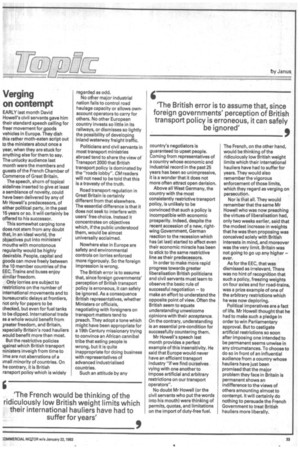Verging on contempt
Page 35

If you've noticed an error in this article please click here to report it so we can fix it.
by Janus EARLY last month David Howell's civil servants gave him their standard speech calling for freer movement for goods vehicles in Europe. They dish this rather moth-eaten script out to the ministers about once a year, when they are stuck for anything else for them to say. The unlucky audience last month were the members and guests of the French Chamber of Commerce of Great Britain.
The speech, shorn of topical sidelines inserted to give at least a semblance of novelty, could have been delivered by any of Mr Howell's predecessors, of either political party, in the past 15 years or so. It will certainly be offered to his successor.
This somewhat carping tone does not stem from any doubt that, in an ideal world, the objectives put into ministers' mouths with monotonous regularity would be highly desirable. People, capital and goods can move freely between the 10 member countries of the EEC. Trains and buses enjoy similar freedom.
Only lorries are subject to restrictions on the number of international movements and to bureaucratic delays at frontiers, not only for papers to be checked, but even for fuel tanks to be dipped. International trade as a whole would benefit from 3reater freedom, and Britain, ?specially Britain's road hauliers Nould benefit more than most.
But the restrictive policies igainst which British transport ninisters inveigh from time to ime are not aberrations of a ;mall minority of countries. On he contrary, it is British ransport policy which is widely regarded as odd.
No other major industrial nation fails to control road haulage capacity or allows ownaccount operators to carry for others. No other European country invests so little in its railways, or dismisses so lightly the possibility of developing inland waterway freight traffic.
Politicians and civil servants in most transport ministries abroad tend to share the view of Transport 2000 that British transport policy is dominated by the "roads lobby". CM readers will not need to be told that this is a travesty of the truth.
Road transport regulation in Great Britain is certainly different from that elsewhere. The essential difference is that it does not seek to interfere with users' free choice. Instead it concentrates on objectives which, if the public understood them, would be almost universally acclaimed.
Nowhere else in Europe are safety and environmental controls on lorries enforced more rigorously. So the foreign impression is wrong.
The British error is to assume that, since foreign governments' perception of British transport policy is erroneous, it can safely be ignored. As a consequence British representatives, whether Ministers or officials, negotiating with foreigners on transport matters tend to preach. They adopt a tone which might have been appropriate for a 19th Century missionary trying to convince an African cannibal tribe that eating people is wrong, but it is quite inappropriate for doing business with representatives of advanced industrialised countries.
Such an attitude by any country's negotiators is guaranteed to upset people. Coming from representatives of a country whose economic and industrial record in the past 25 years has been so unimpressive, it is a wonder that it does not more often attract open derision.
Above all West Germany, the country with the most consistently restrictive transport policy, is unlikely to be convinced that such a policy is incompatible with economic prosperity. Indeed, despite the recent accession of a new, rightwing Government, German reaction to the recession which has fat last) started to affect even their economic miracle has been to stick to the same restrictive line as their predecessors.
In order to make more rapid progress towards greater liberalisation British politicians and civil servants must learn to observe the basic rule of successful negotiation — to make an effort to understand the opposite point of view. Often the British seem to equate understanding unwelcome opinions with their acceptance. On the contrary, understanding is an essential pre-condition for successfully countering them.
Mr Howell's speech last month provides a perfect example of this insensitivity. He said that Europe would never have an efficient transport industry "if we find ourselves vying with one another to impose artificial and arbitrary restrictions on our transport operators".
No doubt Mr Howell (or the civil servants who put the words into his mouth) were thinking of permits, quotas, and limitations on the import of duty-free fuel. The French, on the other hand, would be thinking of the ridiculously low British weight limits which their international hauliers have had to suffer for years. They would also remember the vigorous enforcement of those limits, which they regard as verging on persecution.
Nor is that all. They would remember that the same Mr Howell who was now preaching the virtues of liberalisation had, only two weeks earlier, said that the modest increase in weights that he was then proposing was conceived solely with British interests in mind, and moreover was the very limit. Britain was not going to go up any higher — ever.
As for the EEC, that was dismissed as irrelevant. There was no hint of recognition that such a policy, freezing weights on four axles and for road-trains, was a prize example of one of the arbitrary restrictions which he was now deploring.
Political imperatives are a fact of life. Mr Howell thought that he had to make such a pledge in order to win Parliamentary approval. But to castigate artificial restrictions so soon after imposing one intended to be permanent seems unwise in any circumstances. To choose to do so in front of an influential audience from a country whose hauliers have just been promised that the major problem they face in Britain is permanent shows an indifference to the views of others amounting almost to contempt. It will certainly do nothing to persuade the French Government to treat British hauliers more liberally.




















































































